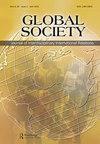建构连续性:作为新自由主义非危机的2008-2009年大崩盘的话语建构
IF 2.3
Q2 INTERNATIONAL RELATIONS
引用次数: 0
摘要
摘要:尽管与20世纪30年代的大萧条和20世纪70年代的通货膨胀和增长危机同时发生,为什么2008-2009年的大崩盘没有在占主导地位的新自由主义经济理念中发挥类似的变革动力?本文借鉴了以主体为中心的建构主义,强调危机构建和叙述的中心地位,但特别强调纳入战略框架过程,对关键行为者行使其代理权的方式提供了新的见解,以确保持续坚持而不是从根本上改变现状。这是参照国际货币基金组织的宏观经济政策假设进行探讨的,这一假设为广泛解读的危机时刻提供了所有先决条件,但却导致了思想和结构的转变。本文章由计算机程序翻译,如有差异,请以英文原文为准。
Constructing Continuity: The Discursive Construction of the Great Crash of 2008–2009 as a Non-crisis of Neoliberalism
ABSTRACT Why, despite being contextualised alongside the Great Depression of the 1930s and inflation and growth crisis of the 1970s, did the Great Crash of 2008–2009 not exert a similarly transformative dynamic in dominant, neoliberal, economic ideas? Drawing on an agent-centred constructivism stressing the centrality of crisis construction and narration, yet with particular emphasis placed upon the incorporation of strategic processes of framing, this article provides fresh insights into the means by which key actors exercise their agency in attempts to ensure continuing adherence to, rather than fundamentally transforming, the status quo. This is explored with reference to macroeconomic policy assumptions in the IMF, an instance which provided all the pre-conditions for a widely interpreted moment of crisis, yet which nevertheless resulted in untransformed ideas and structures.
求助全文
通过发布文献求助,成功后即可免费获取论文全文。
去求助
来源期刊

Global Society
INTERNATIONAL RELATIONS-
CiteScore
3.10
自引率
6.20%
发文量
32
期刊介绍:
Global Society covers the new agenda in global and international relations and encourages innovative approaches to the study of global and international issues from a range of disciplines. It promotes the analysis of transactions at multiple levels, and in particular, the way in which these transactions blur the distinction between the sub-national, national, transnational, international and global levels. An ever integrating global society raises a number of issues for global and international relations which do not fit comfortably within established "Paradigms" Among these are the international and global consequences of nationalism and struggles for identity, migration, racism, religious fundamentalism, terrorism and criminal activities.
 求助内容:
求助内容: 应助结果提醒方式:
应助结果提醒方式:


